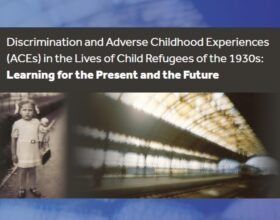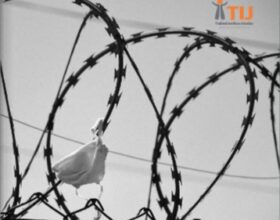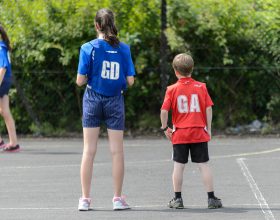
In April 2025, the University of Birmingham published its final evaluation of the Levelling the Playing Field Project, which was overseen by the Alliance of Sport and partners between 2020 and 2023.
+ Read more

In April 2025, the University of Birmingham published its final evaluation of the Levelling the Playing Field Project, which was overseen by the Alliance of Sport and partners between 2020 and 2023.
+ Read more
This report is a must-read for anyone working with or supporting young people and looking to create more inclusive and equitable systems.
+ Read more
This preliminary copy of the report follows a period of research undertaken by AoS looking at how sport is being used to prevent youth crime and build a more resilient ASEAN.
+ Read more
Discrimination and Adverse Childhood Experiences (ACEs) in the Lives of Child Refugees of the 1930s: Learning for the Present and the Future, launched by Aberystwyth University.
+ Read more
This report was produced by the Institute of Health Equity and commissioned by the Health Foundation to mark 10 years on from the landmark study Fair Society, Healthy Lives (The Marmot Review).
+ Read more
Active Lancashire's 'United Together' programme involved local professional football clubs in supporting prison leavers' reintegration into society and reducing re-offending.
+ Read more
This report from Alliance of Sport's partners Thailand Institute of Justice highlights challenges, promising practice, lessons learned and recommendations on how prisons have dealt with COVID-19.
+ Read more
This resource explores the trauma-informed terminology and approaches being used by significant projects, programmes and interventions in Wales.
+ Read more
Literature Review: The use of sport-based mentoring programmes as an intervention for preventing and reducing youth offending
+ Read more
A great resource from Edgework consulting on how to harness the power of sport to foster healing from psychological trauma.
+ Read more
(Re-)Engagement with education and employment is a common objective within interventions designed to enhance social inclusion through sport participation. Consequently, the acquisition of capital...
+ Read more
We analyze Chicago by-the-minute crime reports during major sporting events and find there are significant reductions in crime during televised games
+ Read more
Sports and leisure activities can contribute substantially to the prevention of radicalisation.
+ Read more
This study was designed to investigate yoga teachers' and yoga therapists’ perceptions of the ways yoga is applied to treat symptoms of psychological distress, and identify the defining features...
+ Read more
Being a non-verbal language, sport is particularly useful to ease the integration of the migrants in the hosting societies.
+ Read more

Whilst more studies have examined the potential of sport-based interventions to address broader social concerns, few have focused on the recruitment activities...
+ Read more
This paper examines the reasons that youth offer for opting out of organised sports and how we can understand the social processes involved.
+ Read more
This manuscript was inspired by personal communication with Rich Clementi, retired professional MMA athlete and Ultimate Fighting Championship (UFC) veteran.
+ Read more
Desk review on sport as a tool for the prevention of violent extremism United Nations Office on Drugs and Crime, December 2018
+ Read more
Studies performed on the use of adventure education in therapy have shown that it can change the attitude of problematic students and stop recidivism.
+ Read more
This 2018 report aims to guide and support the development of evidence-based policies and programmes relating to sport in prisons.
+ Read more
This guide provides direction for governmental policy-makers, and other stakeholders, to enable sport to make the fullest possible contribution to sustainable development.
+ Read more
Critical scholars have indicated that the assumptions underlying most sport-for-development (SFD) initiatives tend to align with a ‘deficit model’ of youth: young people from disadvantaged areas...
+ Read more
The Youth Crime Reduction and Sport Pilot Project resulted from StreetGames and the PCC for Derbyshire successfully securing funding from the Home Office Police Innovation Fund.
+ Read more
This study sought to understand the experiences and compile the data to shed light on some of the most excluded groups to allow for more clear and distinct logic to participate in sport.
+ Read more
The UNODC's LINE UP, LIVE UP programme is a life skills training through programme designed to prevent crime, violence and drug use.
+ Read more
This (2017) paper examines the interrelationship between law and lifestyle sports, viewed through the lens of parkour.
+ Read more
This (2017) document aims to provide additional information on crime prevention using sports, including summaries of promising programmes and initiatives both in Canada and internationally.
+ Read more
Reducing social exclusion through interventions designed to sustain school engagement is a key aim of the education and social policy of any government.
+ Read more
Despite their prominence in correctional environments around the world, sport and physical activity are understudied areas of prison life, including in Canada.
+ Read more
Looked-after children are arguably one of the most disadvantaged groups in society and constitute a ‘hidden group’ in relation to sport and physical activity research, policy and practice.
+ Read more
This 2014 paper comprises a small-scale, qualitative study of one such intervention in a Young Offender Institution (YOI) in the South of England.
+ Read more
Researchers have examined sport practices as a means of crime prevention. The article reviews the international body of literature on this subject from a social constructionist perspective.
+ Read more
Developing and Improving Synergies in Chinese and United States Soccer (DISCUSS), was a two-way coaching exchange program that took place in 2010-2011.
+ Read more
This paper explores the use of sport-based intervention (SBI) to tackle the problem of youth crime and anti-social behaviour in the United Kingdom (UK).
+ Read more
Rosie Meek & Gwen Eleanor Lewis (2014) Promoting Well-Being and Desistance Through Sport and Physical Activity: The Opportunities and Barriers Experienced by Women in English Prisons.
+ Read more
Gwen Lewis and Rosie Meek consider levels of participation in different types of prisons, 2012
+ Read more
Laureus Sport for Good report on the costs and benefits of sport for crime reduction.
+ Read more
2002 report by the Social Exclusion Unit
+ Read more
Using sports to control deviance and violence among youths: lets be critical and cautious. Jay Coakley 2002, University of Colorado, Colorado Springs
+ Read more
Examining how austerity has affected third-sector organisations delivering community sport in the UK.
+ Read more
The Alliance of Sport was instrumental in producing evidence for a new book detailing the impact of Covid-19 on sport across the world.
+ Read more
A systematic review and meta-analysis on the effectiveness of sports programmes. Authors Irina Jugl, Doris Bender, Friedrich Lösel
+ Read more
Produced by Deborah Jump and Rachel Horan this report summarises the research evidence on girls and gangs, and how this has been utilised to develop the ‘Getting out for Good’ project.
+ Read more
The Alliance of Sport’s sector wide Theory of Change (ToC) has been analysed by experts in the field of sport and criminal justice to open it up to academic critique and debate
+ Read more
New research on how to form effective partnerships in sport and criminal justice has been published by Dr Haydn Morgan and Dr Colin Baker from the University of Gloucestershire.
+ Read more
Evaluation of a StreetGames programme that used sports-based volunteering and effective coach mentoring to tackle the drivers of serious youth violence.
+ Read more
This research, funded from the Culture and Sport Evidence (CASE) programme, reviews the current evidence base on the social impacts of sport and culture.
+ Read more
Paul Gray, Hannah Smithson and Deborah Jump investigate the links between youth violence and childhood trauma.
+ Read more
‘Valuing Youth Diversion: A toolkit for practitioners’ is an incredibly valuable resource for Sport for Development organisations seeking an evidence base to underpin their work.
+ Read more
Public Health England has released a newly developed online training course on Psychological First Aid (PFA) for supporting children and young people in emergency and crisis situations.
+ Read more
The Violence, Abuse and Mental Health Network has launched a survivor-led report: Safe, Seen, Supported: How to reach and help children and young people experiencing abuse in their households.
+ Read more
A Unicef UK report examining youth justice issues which offers a series of recommended changes to ensure rights of children in contact with the law are properly protected and upheld.
+ Read more
This toolkit from UK Coaching will equip coaches with the knowledge and skills to provide great coaching experiences to others, as well as support coaches to begin to better look after themselves.
+ Read more
This open-access article by Mark Norman from McMaster University in Hamilton, Canada makes a novel argument for increasing the depth of research into sport in prisons and confinement settings.
+ Read more
The Mayor of London has produced a toolkit for practitioners delivering physical activity and sport safely during Covid-19.
+ Read more
Beyond Acronyms: Gypsies, Roma and Travellers in the Criminal Justice System is a useful resource for anyone working with this cohort, including those in Sport for Development.
+ Read more
Fergus McNeill, Professor of Criminology and Social Work, Scottish Centre for Crime and Justice Research at the University of Glasgow, provides an alternative perspective on offender rehabilitation.
+ Read more
This review looks at the literature on how and why poverty and crime influence one another, and the implications for practical policy and strategy.
+ Read more
Download and digest Lord Farmer's report in which he identifies family ties as the "golden thread" running through the processes of all prisons.
+ Read more
This new Ministry of Justice toolkit helps organisations measures the effectiveness of programmes that support individuals’ desistance from crime.
+ Read more
Sport was recognised as an enabler of sustainable development by a United Nations resolution in December 2018. Take a look at the full UN draft resolution.
+ Read more
This guide, produced by Skills for Care, provides advice on employing people with criminal convictions in social care.
+ Read more
This report provides the key findings from the Commonwealth’s consultation on the contribution Sport for Development and Peace (SDP) can make to the 2030 Agenda for Sustainable Development.
+ Read more
The World Health Organisation's global action plan was developed through a worldwide consultation process involving governments and key stakeholders across multiple sectors.
+ Read more
Social justice charity Nacro have produced this useful briefing on the regulations around use of criminal offence data in employment and education.
+ Read more
Read the Government's response addressing each of the recommendations made in "A Sporting Chance: an independent review of sport in youth and adult prisons."
+ Read more
Read the much-anticipated review of sport in criminal justice, published by the Ministry of Justice and Edward Argar MP and authored by Rosie Meek in association with Clinks and the Alliance of Sport.
+ Read more
This evaluation of three boxing academies in New Zealand, led by Dr. Barrie Gordon of Wellington University, outlines their positive effect across many areas of participants' lives.
+ Read more
New research highlights protective factors for psychotic experiences amongst adolescents exposed to multiple forms of victimization - in particular the role of physical activity.
+ Read more
streetfootballworld and Sport4Life have helped produce a new EU-wide toolkit for anyone delivering sports-themed employability programmes for young people.
+ Read more
How can the Sport for Development sector survive in the era of austerity? Read the new study by Cath Walker and Dr John Hayton.
+ Read more
How can sport-based interventions in prisons maximise their impact on psychological wellbeing? Researcher Dave Woods has published an in-depth study.
+ Read more
This Theory of Change is a vision for how sport can work together with the development and criminal justice sectors to achieve maximum impact.
+ Read more
This StreetGames publication reviews the most effective ways to maximise the value of appropriately designed sport-based interventions to policing and youth crime reduction initiatives.
+ Read more
A new study from England Boxing has revealed how and why the sport is so successful in helping to combat anti-social behavioural problems in young people facing disadvantage.
+ Read more
Read the government response to the Charlie Taylor review of the Youth Justice System.
+ Read more
The long anticipated Review of the Youth Justice System in England and Wales by Charlie Taylor has been published.
+ Read more
This research, funded from the Culture and Sport Evidence (CASE) programme, reviews the current evidence base on the social impacts of sport and culture.
+ Read more
EUCPN (2012). Sport, science and art in the prevention of crime among children and youth. EUCPN Thematic Paper No. 1. European Crime Prevention Network: Brussels.
+ Read more
Research on Sport as a Means of Crime Prevention in a Swedish Welfare Context. This is a Literature Review by David Ekholm, Linköping University, Sweden.
+ Read more
This synthesis study by Project Oracle of sport based interventions in London asks: can sport based interventions have a positive impact on levels of youth violence?
+ Read more
Written by Professor Rosie Meek, this is the first book to explore the role of sport in prisons and its subsequent impact on rehabilitation and behavioural change.
+ Read more
Written by Professor Andrew Parker this book explores the various ways in which young people experience sport, physical activity and play as part of their everyday lives...
+ Read more
This report commissioned by Comic Relief explores the role of sport in providing relevant skills, training and pathways to employment.
+ Read more
This report assesses the economic value of three sports projects aimed at tackling gang violence and youth crime in the UK.
+ Read more
Through this strategy, government is redefining what success in sport means, with a new focus on five key outcomes.
+ Read more
This report is the result of an 18-month research project exploring how the Urban Stars initiative works with young people in community and custody.
+ Read more
Prisoner Education Trust have produced this Fit for Release report which identifies how sports-based learning can help prisoners engage in education, gain employment and desist from crime.
+ Read more
This report summarises the evaluation findings of the 2nd Chance Project football and rugby acadamy, a two year initiative at HMYOI Portland.
+ Read more